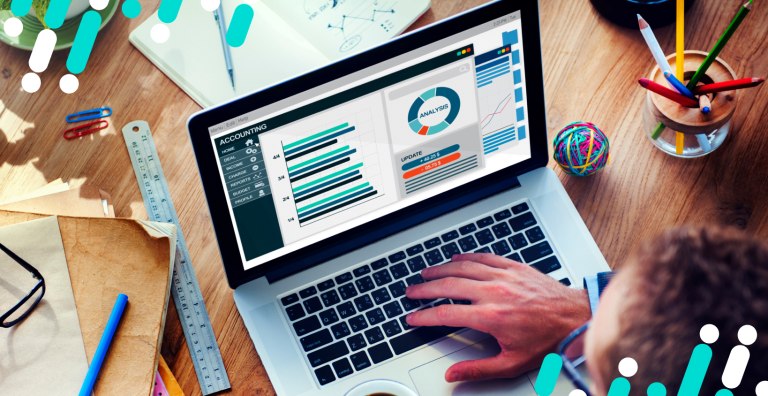The field of accounting is transforming on several levels. Traditional accounting methods fall short in the face of digital tools and big data. Traditional accounting simply cannot keep up with the rapid change. Initially, the change heralded automation, efficiency, and reduction of manual inputs. With the emergence of digital tools, platforms, apps, and software, traditional accounting is now a relic of the past. Accounting today is highly data-driven and poised to take centre stage, largely due to the demand for real-time information, predictive analytics, and business insights based on large data sets.
What is data-driven accounting, and why is it the future of financial management? In this blog, we will investigate how data-driven accounting is changing the financial sector, its primary advantages, and how businesses of all kinds may use data to enhance their financial management systems.
Data-Driven Accounting
Data-driven accounting integrates modern technologies and data analytics into the accounting process to increase accuracy, simplify financial administration, and improve decision-making. It analyses, interprets, and acts upon real-time information using vast volumes of financial data, automation, artificial intelligence (AI), and machine learning rather than depending solely on conventional bookkeeping and financial reporting techniques.
Data-Driven Accounting: The Advantages
1. Fewer Errors and Enhanced Accuracy
The reduced human error of data-driven accounting is among its most significant advantages. Typical elements of conventional accounting systems are manual data entry, which can lead to mistakes such as erroneous entries, misplaced decimal points, or miscalculations. Even seasoned accountants might make blunders when working with large amounts of data.
Using automated accounting systems driven by artificial intelligence and machine learning will help companies reduce these mistakes. With a great degree of precision, automated systems can rapidly process and analyse vast amounts of data, guaranteeing accurate and current financial records. This lowers the chance of compliance problems or expensive mishaps and produces more consistent financial reports.
2. Real-Time Financial Data
Sometimes, companies had to wait weeks or even months to get consistent financial data. This delay in reporting could make it difficult for decision-makers to identify growing hazards or adjust their response to changing financial situations. Data-driven accounting enables businesses to have real-time financial data, therefore enabling faster decision-making.
3. Better Predictive Analytics and Forecasting
Financial forecasting has long relied on previous performance and future presumptions. This approach sometimes fails in the face of shifting markets, unplanned events, or changing customer behaviour. Conversely, by leveraging predictive analytics, data-driven accounting enables businesses to produce more accurate projections.
By evaluating previous trends, existing data, and outside variables—such as industry benchmarks or market conditions—data-driven accounting systems can more precisely project future financial results. These insights can help businesses maximise budgets, draft expansion strategies, and lower possible risks before they become problems.
4. Enhanced Data Visualisation-Based Decision-Making
Financial data is shown clearly via dashboards and visual analytics tools. By converting complex financial data into reasonable charts, graphs, and reports, these tools and systems help to ease their interpretation.
Data visualisation lets businesses spot trends, anomalies, and useful insights fast. Facts visualisation helps leaders make better informed decisions based on actual facts rather than gut sentiments about cash flow patterns, performance appraisal of many company divisions, or consumer behaviour.
5. Flexibility and Scalability
Businesses grow, and with them, their financial operations evolve, too. Conventional accounting techniques can find it difficult to match the growing complexity of handling funds across several departments, sites, or platforms. However, data-driven accounting systems are easily scalable by nature.
For example, cloud-based accounting systems let companies expand their financial processes without making large infrastructure investments.
Data-Driven Accounting: How Best to Implement It
Here are some actions firms wishing to adopt data-driven accounting could start from:
1. Make Proper Technological Investments
Investing in contemporary accounting software with built-in data analytics features and integration with other business tools comes first. Real-time financial data and the customisation capabilities of cloud-based solutions such as QuickBooks, Xero, and NetSuite help businesses of all kinds.
2. Leverage Automation
Program regular accounting chores, including reconciliation, spending monitoring, and invoicing. This will lower your chance of mistakes and spare time for more effective financial planning.
3. Develop Data Strategy
Developing a well-defined data strategy can help you to maximise your financial data. This should cover defining important performance indicators (KPIs), spotting the kinds of data you require, and deciding how data will be gathered, examined, and presented.
4. Team Training
Data-driven accounting depends on both technology and human knowledge, hence, it’s important to train your team. Make sure your accounting staff knows how to evaluate the insights produced by data analytics and is qualified to use the new tools. This can call for funding fresh talent with data analysis and financial technology knowledge or investing in professional development.
5. Verify Data Security and Compliance
Rising data sharing and cloud computing force companies to prioritise data security and guarantee financial regulatory compliance. To safeguard private financial data, utilise strong security systems and stay abreast with pertinent rules, regulations, and frameworks.
You can leverage data-driven accounting and harness its advantages through award-winning platforms like Pulse. Pulse is a comprehensive, intuitive platform that offers several tools, features, and modules designed to help businesses grow, automate, streamline, and excel. Track KPIs, set goals, leverage trend analysis, study your firm’s entire financial health in one place, and access powerful modules. Our accounts receivable module DebtorIQ, and cashflow forecasting module – aiPredict can transform your business. To know more, book a demo today.
The Future of Financial Management
Data-driven accounting is likely to become a mainstay of financial management going forward. Data and automation help companies better understand their financial performance, streamline processes, and make more informed decisions that may maximise operations. Maintaining a competitive edge in an evolving financial environment will depend mostly on your capacity to forecast future trends, react to developments in real time, and propel operational efficiency.
Data-driven accounting is the future of financial management—not merely a fad. Businesses that adopt data-driven accounting will be better suited to survive in a dynamic environment as technology develops and data becomes more available.

















